
In Pursuit: Marriage, Motherhood, and Women’s Well-Being
by: Jean M. Twenge, Jenet Erickson, Wendy Wang, and Brad Wilcox
Marriage and fertility rates have reached all-time lows in the U.S. in recent years, as fewer people marry or have children. These trends are likely to continue in the future. In 2023, only 72% of 18-year-old women in the U.S. said they were likely to have children, down from 85% in the late 2000s.1
Though there are likely many reasons for the declines in marriage and childbearing, one possible factor is the way marriage and parenthood, particularly for women, are portrayed in the media and in online discussions. Popular press articles often declare that single women without children are happier than married mothers, with headlines such as: “Women are happier without children or a spouse, says happiness expert,” or “4 reasons why single women are the happiest people on Earth—by a psychologist,” and “Why so many single women without children are happy.” Discussions on online forums such as Reddit ask, “Why do you think that single unmarried women without children are happier than married women with children?”
These headlines are consistent with older survey data suggesting parents are less happy than non-parents, especially in the United States.2 They are also consistent with studies finding that parenthood is more positive for men than for women.3 However, parenthood may increase other aspects of well-being, especially finding meaning in life.4
In addition, studies repeatedly find that married people are generally happier than unmarried people.5 Being married is the most important differentiator of happiness in America, with married people 30 percentage points happier than unmarried people.6 However, little of this research has focused specifically on women, and it is unclear how marriage and motherhood are linked to one another and to women’s happiness.
There is a significant gender divide in the perception of marriage and happiness. A majority of both men (58%) and women (53%) agree that men who marry and have children are better off than those who do not. But only 32% of women believe that women who marry and have children live fuller, happier lives.7 At the same time, 55% of single women believe single women are generally happier than married women.8 In a 2024 Pew Research survey, less than half of single women (45%) said they eventually wanted to have children, while a majority of single young men (57%) said parenthood was an important life goal for them.9
Clearly, many single women today perceive getting married or becoming a mother to be transitions of loss. But is this perception true?
New data paint a different picture. In the 2022 General Social Survey (GSS), the nation’s leading social barometer, married mothers are happier than single childless women as well as married childless women and unmarried mothers.10 Other surveys have found similar results.11
To better clarify how marriage and motherhood are linked to women’s happiness, we fielded the Women’s Well-Being Survey (WWS) of 3,000 U.S. women, ages 25 to 55, conducted by YouGov in early March 2025 (for details, see About the Data and Methodology). We wanted to know: Why are married mothers the happiest group of women?
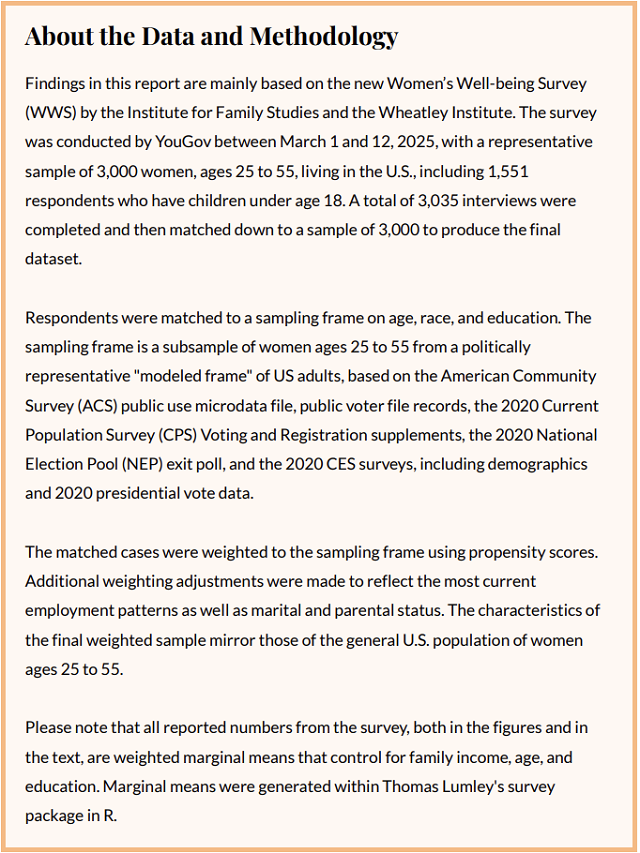
Happiness
Consistent with previous surveys, our new survey finds that married mothers are happier than unmarried women or women without children. Nearly twice as many married mothers say they are “very happy” as unmarried women without children.
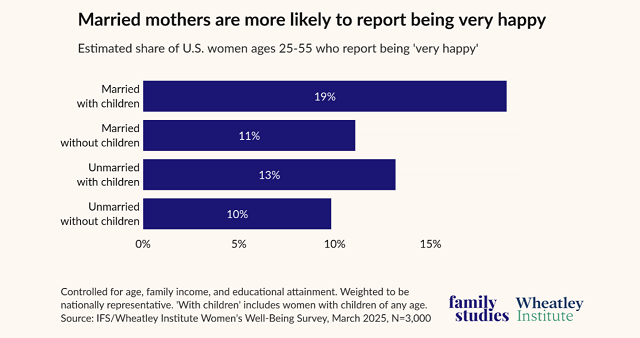
Figure 1. Estimated share of U.S. women ages 25-55 who report being ‘very happy’
Source: IFS/Wheatley Institute, Women’s Well-Being Survey, March 2025
Married mothers are also significantly more likely to be very happy than married women without children and unmarried women with children. The analyses presented in this report control for age, family income, and education, so these factors cannot be the reason for the differences.
Married women are also more likely than unmarried women to say that life was enjoyable most or all of the time: 47% of married mothers and 43% of married childless women say life is enjoyable, compared to 40% of unmarried mothers and 34% of unmarried childless women.12
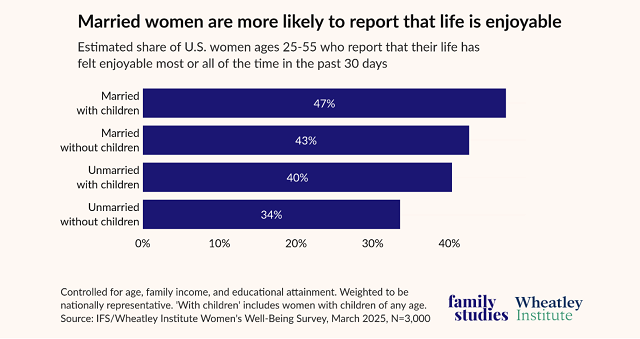
Figure 2. Estimated share of U.S. women ages 25-55 who report that their life has felt enjoyable most or all of the time in the past 30 days. Source: IFS/Wheatley Institute, Women’s Well-Being Survey, March 2025
Why are married mothers happier? Both marriage and motherhood appear to play a role, though in different ways.
Social Connection
Some past research has argued that marriage is linked to greater isolation, finding that, as The Atlantic put it, married people are
less likely to visit or call parents and siblings—and less inclined to offer them emotional support or pragmatic help with things such as chores and transportation. They are also less likely to hang out with friends and neighbors.13
Single people, in contrast, had more contact with friends and extended family members. This research, focusing primarily on adult experiences in the 1990s and 2000s, suggests that married women might feel more isolated and alone.14
However, our survey finds that married women are markedly less likely to feel lonely: 11% of married mothers and 9% of married women without children feel lonely most or all of the time, compared to 23% of unmarried mothers and 20% of unmarried childless women. Thus, married women are only about half as likely as unmarried women to often feel lonely, with motherhood having less impact on loneliness.
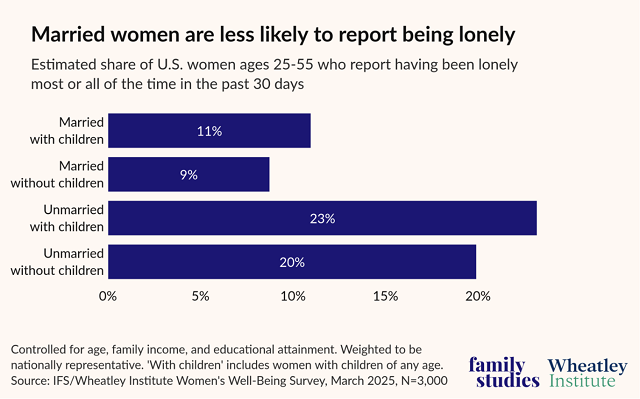
Figure 3. Estimated share of U.S. women ages 25-55 who report having been lonely most or all of the time in the past 30 days. Source: IFS/Wheatley Institute, Women’s Well-Being Survey, March 2025
Contrary to a popular narrative that marriage entails social isolation, these findings show that married women are less lonely. While getting married and having children may mean less time hanging out with friends, marriage and children are also associated with other kinds of social engagement, including volunteer work, church attendance, and community connections.15 Moreover, in this new survey, married mothers are just as likely to say they feel satisfied with their number of friends as other women. In addition, unmarried women without children are more likely to report difficulties with making new friends than married and unmarried moms. The relationship between family status and friendship for adults may have changed since the pre-digital era when the previous research was conducted. That is, since the rise of the smartphone, marriage and motherhood may have become more important for facilitating social connections and protecting against the atomization now being induced by new technologies. So it’s possible that, today, women with family ties have more social ties than women without a spouse or children.
Physical Touch
Americans spent 67 fewer hours per year in face-to-face social interactions in 2017 than they did in 2003; younger Americans (ages 15 to 25) spent 140 fewer hours per year.16With people spending more time online and less time with others in person, there are fewer opportunities for physical touch, leading to what some call “touch hunger.”17
Physical touch has not been frequently explored in survey data on well-being, but new research suggests it may play an important role in women’s emotional and social health. Touch, especially from a spouse, has been linked to relaxation, increased trust, greater feelings of safety, and increased emotional resilience in multiple studies.18 Touch elicits the release of oxytocin in the brain, promoting relaxation and reducing stress, while decreasing the sympathetic nervous system’s stress response.19 Lack of physical touch has been linked to feelings of loneliness and isolation.20
The link between touch and emotional well-being in adulthood appears to be an extension of the important role of touch for development beginning in infancy. The attachment relationship that lays the foundations for development beginning in infancy is grounded in touch. As a mother and infant touch, oxytocin and prolactin hormones surge in her body, enhancing the bond through which she regulates her infant’s emotions and lays the foundations for the infant’s development. Not only does touch profoundly impact the infant, but it also strengthens the experience of well-being for the mother. Evidence suggests that touch continues to play an important role in bonding, emotional regulation, and well-being across the life course.
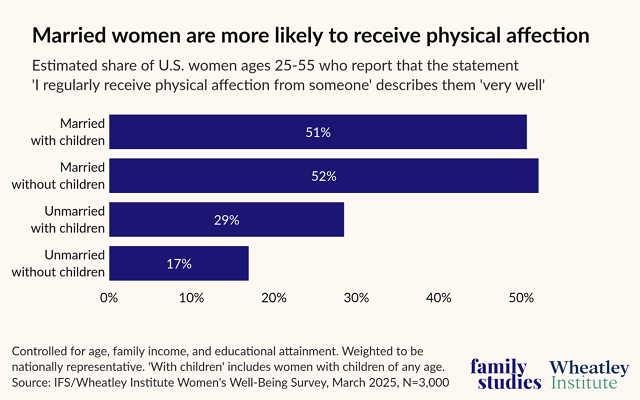
Figure 4. Estimated share of U.S. women ages 25-55 who report that the statement, ‘I regularly receive physical affection from someone’ describes them ‘very well.’ Source: IFS/Wheatley Institute, Women’s Well-Being Survey, March 2025
In the WWS, married women (both with and without children) report significantly higher levels of touch than unmarried women. Specifically, 47% of married mothers and 49% of married women without children report high physical touch levels; meanwhile, only 23% of unmarried mothers and 13% of unmarried women without children do.
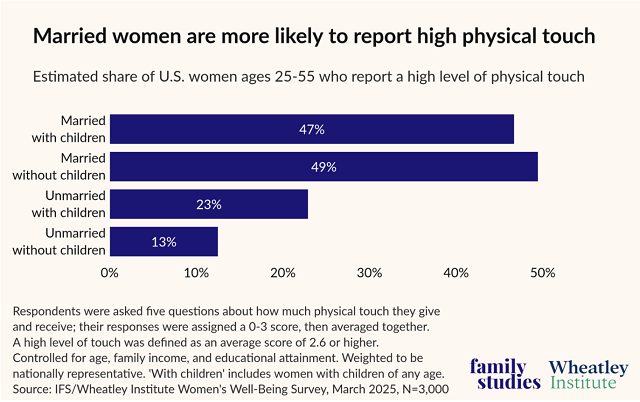
Figure 5. Estimated share of U.S. women ages 25-55 who report a high level of physical touch. Source: IFS/Wheatley Institute, Women’s Well-Being Survey, March 2025
More frequent touch is itself a significant predictor of increased happiness. Only 7% of women who report low levels of touch are very happy with their lives. In contrast, 22% of women who report high levels of touch are very happy.
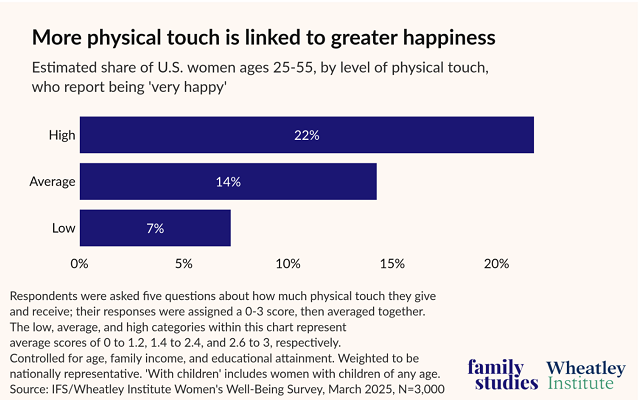
Figure 6. Estimated share of U.S. women ages 25-55, by level of physical touch, who report being ‘very happy.’ Source: IFS/Wheatley Institute, Women’s Well-Being Survey, March 2025
Thus, one factor that explains why married women are happier than their unmarried peers is that they have more regular opportunities for kissing, hugging, and snuggling. For example, 58% of married women with children and 61% of married women without children report that they often get hugs or kisses, while only 36% of unmarried mothers and 18% of unmarried women without children report the same.
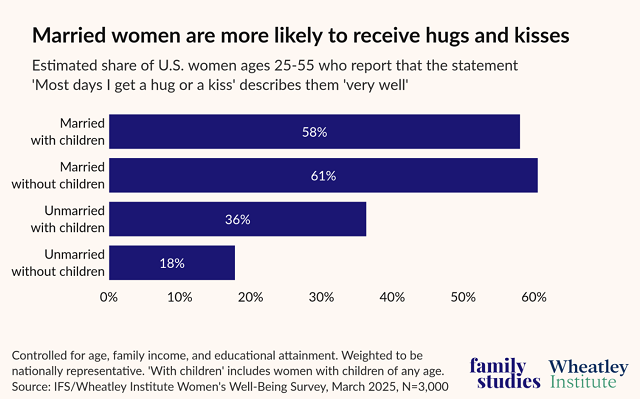
Figure 7. Estimated share of U.S. women ages 25-55 who report that the statement, ‘Most days I get a hug or a kiss’ describes them ‘very well.’ Source: IFS/Wheatley Institute, Women’s Well-Being Survey, March 2025
Similarly, married women are much more likely than unmarried women to say they hold hands often. Married women with children are almost twice as likely to hold hands frequently as unmarried women with children, and married women without children are over four times as likely to hold hands as often as unmarried women without children.
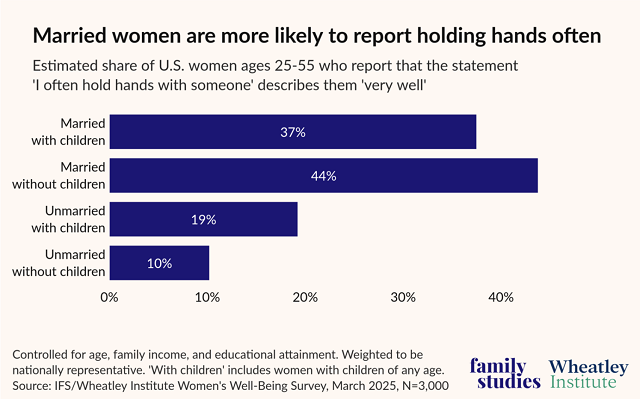
Figure 8. Estimated share of U.S. women ages 25-55 who report that the statement, ‘I often hold hands with someone’ describes them ‘very well.’ Source: IFS/Wheatley Institute, Women’s Well-Being Survey, March 2025
Finally, similar percentages of married mothers (48%) and married childless women (49%) say that they regularly get to snuggle and cuddle with someone, whereas only 26% of unmarried mothers and 14% of unmarried women without children do.
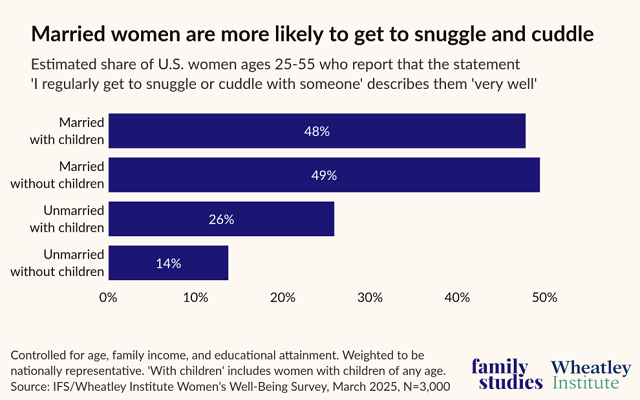
Figure 9. Estimated share of U.S. women ages 25-55 who report that the statement, ‘I regularly get to snuggle or cuddle with someone’ describes them ‘very well.’ Source: IFS/Wheatley Institute, Women’s Well-Being Survey, March 2025
Interestingly, within each of these categories, married women with and without kids report similar levels of touch. However, among unmarried women, those who have children tend to report higher levels of touch than those without children. The extra opportunities for touch that a child provides may not make a major difference for married women, but having a child might allow for many more opportunities to give and receive touch for unmarried mothers.
Meaning and Purpose
Motherhood is connected to happiness and well-being through other means, including finding meaning and purpose in life. For example, mothers are more likely to strongly agree that “what I do in life is valuable and worthwhile”: 33% of married mothers and 30% of unmarried mothers agree with this statement, compared to 24% of married women without children and 20% of unmarried women without children. Mothers are also more likely than childless women to strongly agree that “my life has a clear sense of purpose.”
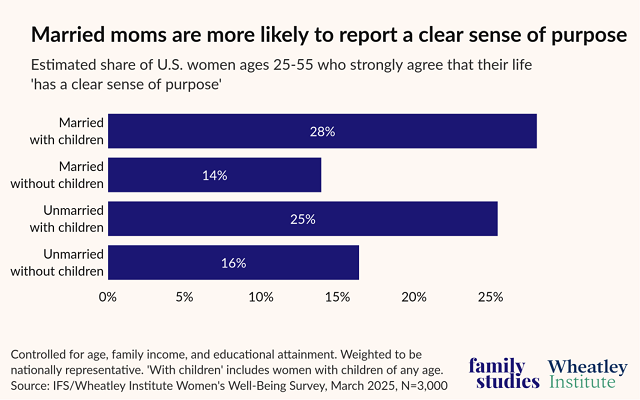
Figure 10. Estimated share of U.S. women ages 25-55 who strongly agree that their life ‘has a clear sense of purpose.’ Source: IFS/Wheatley Institute, Women’s Well-Being Survey, March 2025
In addition, 49% of married mothers say their life feels meaningful all or most of the time, compared to 43% of unmarried mothers, 41% of married women without children, and 32% of unmarried women without children. Overall, women with children find more purpose and meaning in their lives than women without children.
Motherhood Challenges
To be fair, the WWS found that motherhood comes with many challenges as well. Mothers are more likely than non-mothers to feel overwhelmed and exhausted each day. About 64% of married and unmarried mothers report feeling overwhelmed on a daily basis, compared to 56% of married and single women without children. Additionally, 79% of unmarried mothers and 77% of married mothers feel exhausted every day, though 71% of unmarried childless women and 72% of married childless women do as well.
Mothers also say they have less time to themselves: 59% of unmarried mothers and 58% of married mothers report they wish they had more time for themselves, compared with 40% of married childless women and 43% of unmarried childless women. Yet, as we have shown, married mothers simultaneously report greater happiness, meaning, and purpose.
Conclusion
Contrary to the common narrative that women who marry and have children are unhappy, the 2025 Women’s Well-Being Survey finds that married mothers are happier than women who are unmarried and women who do not have children. Both marriage and motherhood contribute to well-being in different ways. Married women are more likely than their unmarried counterparts to report feeling deep connection and meaning in their relationships. They are also less likely to be lonely and more likely to receive physical affection—both strong predictors of happiness. Mothers are also more likely to find meaning and purpose in life.
Despite the challenges associated with family life for women—including more stress and less time for oneself—there is no question that marriage and motherhood are linked to greater female flourishing on many other fronts. Moreover, marriage shapes and magnifies the experience of motherhood. Unmarried mothers with children still identify more purpose and meaning than childless women, but they are less happy, more stressed, and lonelier than married mothers.
Marriage appears to offer a stabilizing and supportive context that lifts the burdens of motherhood, while strengthening happiness, connection, and meaning. That reality should invite our best efforts, both culturally and politically, to support and strengthen single mothers even as we also work to increase the likelihood and quality of marriages. The opportunities for greater touch, less loneliness, and more meaning seem to provide married mothers the most joyful lives.
Endnotes
1. Jean M. Twenge, Generations: The Real Differences between Gen Z, Millennials, Gen X, Boomers and Silents— and What They Mean for America’s Future, 2nd edition (Atria Books, 2025).
2. Jennifer Glass, Robin W. Simon, & Matthew A. Andersson, “Parenthood and happiness: Effects of workfamily reconciliation policies in 22 OCED countries,” American Journal of Sociology 122 (2016): 886-929.
3. S. Katherine Nelson, Kostadin Kushlev, et al., “In defense of parenthood: Children are associated with more joy than misery,” Psychological Science 24 (2013): 3–10.
4. Roy F. Baumeister, Kathleen D. Vohs, et al., “Some key differences between a happy life and a meaningful life,” The Journal of Positive Psychology 8 (2013): 505-516; Paul Bloom, The Sweet Spot: The Pleasures of Suffering and the Search for Meaning (Ecco, 2012); Op. Cit., S. Katherine Nelson, S. Kostadin Kushlev, et al. (2013).
5. Steven Stack and J.Ross Eshleman, “Marital status and happiness: A 17-nation study,” Journal of Marriage and the Family 60 (2018): 527-536.
6. Sam Peltzman, “The Socio-Political Demography of Happiness,” George J. Stigler Center for the Study of the Economy & the State, Working Paper No. 331, July 12, 2023.
7. Daniel A. Cox, “Is marriage better for men?” American Storylines, November 30, 2023.
8. Daniel A. Cox, “Why fear governs so many of the choices single young women make,” American Storylines, November 28, 2024.
9. Carolina Aragao, “Among young adults without children, men are more likely than women to say they want to be parents someday,” Pew Research Center, February 15, 2024.
10. Brad Wilcox and Wendy Wang, “Who is happiest? Married mothers and fathers, per the latest General Social Survey,” Institute for Family Studies Blog, September 12, 2023.
11. Wendy Wang and Brad Wilcox, “Women want more children than they're having. America can do more to help,” Deseret News, August 13, 2024.
12. These numbers, along with other reported survey results, are weighted marginal means that adjust for family income, age and education.
13. Mandy Len Catron, “What you lose when you gain a spouse,” The Atlantic, July 12, 2019.
14. Natalia Sarkisian and Naomi Gerstel, “Does singlehood isolate or integrate? Examining the link between marital status and ties to kin, friends, and neighbors,” Journal of Social and Personal Relationships 33, no. 3 (2016): 361-384.
15. Nicholas H. Wolfinger, “Marriage means community engagement: a Response to Mandy Len Cantron,” Institute for Family Studies Blog, July 22, 2019.
16. Jean M. Twenge and B.H. Spitzberg, “Declines in non-digital social interaction among Americans, 2003–2017,” Journal of Applied Social Psychology 50, no. 6 (2020): 363–367.
17. Krystine Batcho, “Are you hungry for touch in a touch-free world?” Psychology Today, June 15, 2018; T. Field, “Touch for socioemotional and physical well-being: A review,” Developmental Review 30, no. 4 (2010): 367-383.
18. James A. Coan, Hillary S. Schaefer, and Richard J. Davidson, “Lending a hand: Social regulation of the neural response to threat,” Psychological Science 17, no. 12 (2006): 1032-1039; Aljoscha Dreisoerner, Nina M. Junker, et al., “Self-soothing touch and being hugged reduce cortisol responses to stress: A randomized controlled trial on stress, physical touch, and social identity,” Comprehensive Psychoneuroendocrinology 8 (2021): 100091; Tiffany Field, “Touch for socioemotional and physical wellbeing: A review,” Developmental Review 30, no. 4 (2010): 367-383.
19. Julliane Holt-Lunstad, Wendy A. Birmingham, and Kathleen C. Light, “Influence of a ‘Warm Touch’ Support Enhancement Intervention Among Married Couples on Ambulatory Blood Pressure, Oxytocin, Alpha Amylase, and Cortisol,” Psychosomatic Medicine 70, no. 9 (2008): 976-985.
20. A. Heatley Tejada, Robin I. M. Dunbar, M. Montero, “Physical contact and loneliness: Being touched reduces perceptions of loneliness,” Adaptive Human Behavior & Physiology 6, no. 3 (2020): 292-306.
Author Bios
Jean M. Twenge is Professor of Psychology at San Diego State University and the author of more than 190 scientific publications and books.
Jenet Erickson is a Fellow of the Wheatley Institute, Associate Professor in Religious Education in the School of Family Life at Brigham Young University, and a Senior Fellow at the Institute for Family Studies.
Wendy Wang is Director of Research at the Institute for Family Studies. She formerly served as a Senior Researcher at the Pew Research Center.
Brad Wilcox is Senior Fellow at the Institute for Family Studies. He is also a Visiting Scholar at the American Enterprise Institute, and Distinguished University Professor of Sociology at the University of Virginia.





